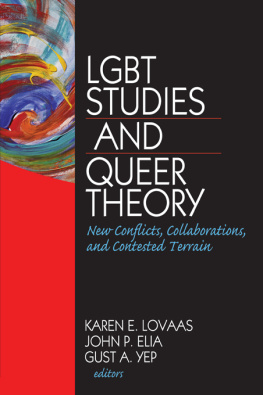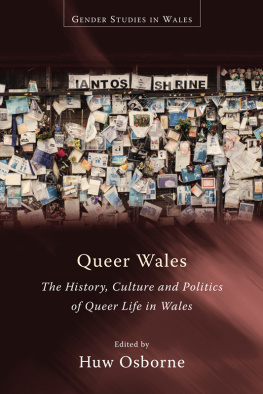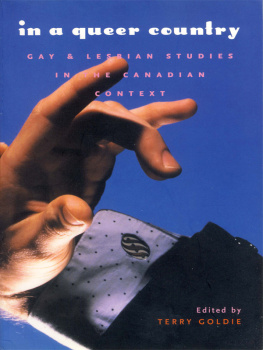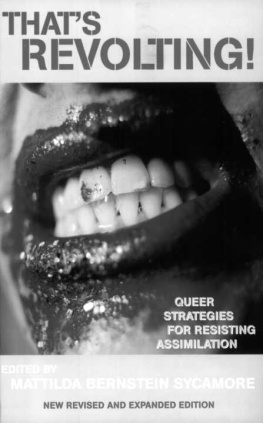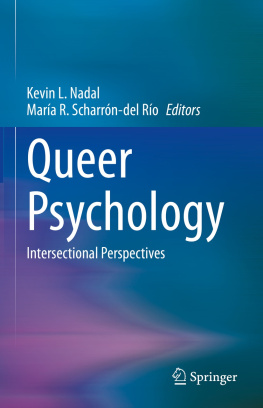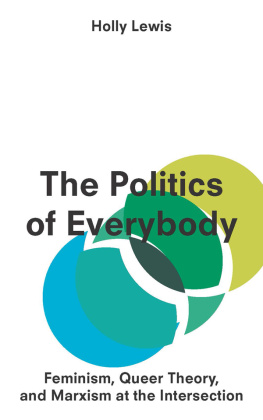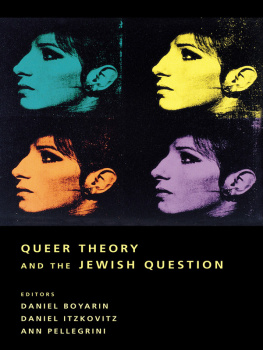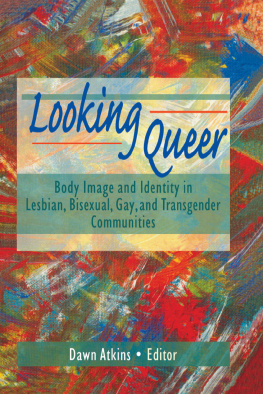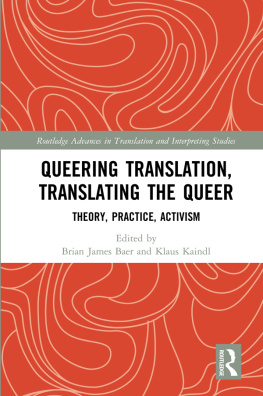
Thinking Queerly
Cultural Politics and the Promise of Democracy
A Series from Paradigm Publishers
Edited by Henry A. Giroux
Academe Degree Zero: Reconsidering the Politics of Higher Education (2011), Jeffrey Di Leo
Thinking Queerly: Race, Sex, Gender, and the Ethics of Identity (2010), David Ross Fryer
Against the Terror of Neoliberalism (2008), Henry A. Giroux
Patriotic Correctness: Academic Freedom and Its Enemies (2008), John K. Wilson
The Giroux Reader (2006), Henry A. Giroux, edited and introduced by Christopher G. Robbins
Not Only the Masters Tools: African American Studies in Theory and Practice (2006), edited by Lewis R. Gordon and Jane Anna Gordon
Pedagogies of the Global: Knowledge in the Human Interest (2006), Arif Dirlik
Michel Foucault: Materialism and Education, Updated Edition (2006), Mark Olssen
Listening Beyond the Echoes: Media, Ethics, and Agency in an Uncertain World (2006), Nick Couldry
Schooling and the Struggle for Public Life, Updated Edition (2005), Henry A. Giroux
Why Are We Reading Ovids Handbook on Rape? Teaching and Learning at a Womens College (2005), Madeleine Kahn
Reading and Writing for Civic Literacy: The Critical Citizens Guide to Argumentative Rhetoric (2005), Donald Lazere
Caught in the Crossfire: Kids, Politics, and Americas Future (2005), Lawrence Grossberg
Empire and Inequality: America and the World Since 9/11 (2004), Paul Street
Thinking Queerly
Race, Sex, Gender, and the Ethics of Identity
David Ross Fryer
with a foreword by Riki Wilchins
First published 2012 by Paradigm Publishers
Published 2016 by Routledge
2 Park Square, Milton Park, Abingdon, Oxon OX14 4RN
711 Third Avenue, New York, NY 10017, USA
Routledge is an imprint of the Taylor & Francis Group, an informa business
Copyright 2012, Taylor & Francis.
All rights reserved. No part of this book may be reprinted or reproduced or utilised in any form or by any electronic, mechanical, or other means, now known or hereafter invented, including photocopying and recording, or in any information storage or retrieval system, without permission in writing from the publishers.
Notice:
Product or corporate names may be trademarks or registered trademarks, and are used only for identification and explanation without intent to infringe.
Library of Congress Cataloging-in-Publication Data
Fryer, David Ross.
Thinking queerly: race, sex, gender, and the ethics of identity / David Ross Fryer; forward by Riki Wilchins.
p. cm. (Cultural politics and the promise of democracy)
Includes bibliographical references.
ISBN 978-1-59451-359-6 (hbk.: alk. paper)
ISBN 978-1-59451-360-2 (pbk.: alk. paper) 1. Queer theory. 2. Identity (Psychology) Moral and ethical aspects. I. Title.
HQ76.25.F79 2009
306.7601dc22
2009026877
ISBN 13: 978-1-59451-359-6 (hbk)
ISBN 13: 978-1-59451-360-2 (pbk)
Designed by Straight Creek Bookmakers.
To Lewis Gordon, in friendship
Contents
A Question of Language
Everyday language is not innocent or neutral. It is the language of Western metaphysics, and it carries within it presuppositions of all types.
John McGowan, Postmodernism and Its Critics
"For [Foucault] Western thought since Descartes has assumed the innocence of reason."
Mark Poster, Critical Theory and Poststructuralism
"The art of appropriating the universal was the main business of the Enlightenment."
Mark Poster, Critical Theory and Poststructuralism
The philosophical tradition, at least from Plato on, has always favored the concept of the same; i.e., the aim of philosophical thought has been to reveal the essential characteristics that two things hold in common."
John McGowan, Postmodernism and Its Critics
What are we to make of experience? Clearly we experience a sense of self, and we all experience sensations in the world. And yet, if we are to believe the postmodernists like Foucault and Butler, these selves, these particular subjects we become, are not "us" in any private and authentic way. Rather, these selves we occupy are the product of very specific social regimes. These regimes determine which selves are authorized and which are not, and then compel us to inhabit them. All the while, these effects are largely hidden behind discourses of naturalness, inevitability, and universality. For instance, the system of binary gender regulation has 4 main rules:
- Everyone must be in a box.
- There are only two boxes.
- No one can change boxes and no one can be in the middle.
- You can not pick your box.
There is nothing essential about these rules. In fact, they are surprisingly arbitrary and could have been organized quite differently. But we are taught from birth that we are boys or girls. That designation tells us which colors to like, what interests to have, which emotional displays are authorized and which are frowned upon, differential ways of standing, crossing our legs, inflecting our voice, buttoning our clothes, shaving our bodies, and styling our hair. In fact the list of social traits we are called to recognize is fairly endless.
None of this is inevitable or even natural. Much of it is not even universal. Yet through this "micropolitics of power." through a thousand small daily interactions and communications of knowledge we learn to be and experience ourselves as very particular kinds of masculine or feminine subjects. This is a kind of power we on the left are still not good at seeing. It is one reason Foucault and Butler demand us to not assume the innocence of the self, that we look upstream to see how we came to inhabit these specific selves, how they arose and whose interests this kind of self-hood serves. They ask us, in short, to give the subjective experience of self its own history.
With gender, this is difficult, since there are few alternatives to which it might be compared. One of the most compelling aspects of the gender system is that it is so widespread and effective that, until now, most of us have never seen anything else. Moreover, most of us could not recognize it if we saw it. We would simply try to categorize any new gender into one of the two available boxes.
There is a story of an anthropologist who went looking for a third gender. He went to a remote island where rumor had it there were five different genders. Yet he soon left disappointed. When asked what had happened, he replied, When I got there, I found that just like every other culture weve studied, they had only two genders after all." We cannot see what we cannot name, and what may not exist. Thus does knowledge itself become coercive, forcing us to see some things and marginalize others.
And yet, although most of us believe that our gender is both inevitable and natural, still there is a tremendous amount of social anxiety about it. We worry that we will not be perceived as masculine enough or feminine enough. We are embarrassed if someone accidentally uses the wrong pronoun on the phonea mistake that would be utterly humiliating should it happen face-to-face. We even worry that if our kids dont appear gender-normative, people will blame us for not raising them properly. So we butch it up. We try to look more feminine. We make sure our daughters look distinctively feminine, and that our boys dont cry or play with dolls. We conform to the kinds of subjectivity that are expected, even demanded of us. For a natural fact, society invests a lot of energy in assuring gender normativity, and we pay a lot of attention to it.



